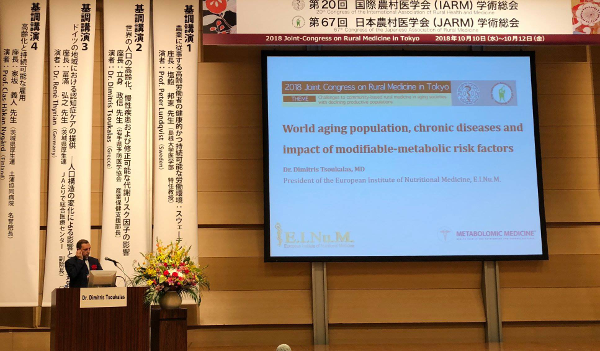This October in Tokyo was held the 2018 Joint Congress on Rural Medicine, a very important event where medical leaders were called to talked about an important topic: World Aging Population.
EINUMM’s President Dr. Dimitris Tsoukalas was called and he presented a speech on Chronic diseases and impact of modifiable-metabolic risk factors.
This is the abstract of Dr. Tsoukalas speech:
For many decades, overpopulation was one of the major concerns of the modern world as a cause of struggle for resources in the next generations. This concept has been refuted based on birth rate facts and statistical data. The number of births per household decreases as we move to more educated and high-income countries.  In fact, according to the U.N. Population Database, the Earth’s population will peak in 30 years at 8 billion people and then start to decline. Attention has now been given to the demographic structures of the globe, as we move towards developed countries with an increasingly aging and shrinking population and growing but poor developing countries. This will lead to substantial production decrease in the developed countries, and increasing pressure from the poorer to move towards the developed world. However, the “aging society” threat can be prevented by maintaining healthy and productive populations at older ages.
In fact, according to the U.N. Population Database, the Earth’s population will peak in 30 years at 8 billion people and then start to decline. Attention has now been given to the demographic structures of the globe, as we move towards developed countries with an increasingly aging and shrinking population and growing but poor developing countries. This will lead to substantial production decrease in the developed countries, and increasing pressure from the poorer to move towards the developed world. However, the “aging society” threat can be prevented by maintaining healthy and productive populations at older ages.
Over the last centuries life expectancy has increased twofold due to medical advances in vaccination, clean drinking water, appropriate sewage system and basic hygiene education. We have managed to almost eliminate several deadly serious diseases and infections in all industrialized countries and most countries of the developing world. Japan is the number one country that has managed to achieve high life expectancy rates, and Greece ranks third. However, chronic diseases remain to be the main cause of death and significantly deteriorate the quality of life. This modern pandemic account for the 70% of the total deaths worldwide. Most of these deaths, that is 80%, can be prevented according to World Health Organization. Over 95% of the population has one or more health problems raising many economical, demographic and sociological issues. What is the background of those figures in Greece?
Historically, Greece has been one of the healthiest in Europe. However, the financial crisis and other socio-economic factors had a major impact on Greeks which rank among the first in children obesity. Although Mediterranean diet has been generally approved to be healthy, deviation from natural products has devastated the health status, particularly in young boys. Income reduction is one of the main factors of the huge rise of children and adolescent obesity, making fresh food unreachable thus opting for processed and low nutritional value food. In addition, environment has immensely changed over the past century, in terms of climate change and soil degradation leading to food quality deterioration up to 80%. Modifiable metabolic risk factors have major impact on health with tobacco smoke, high systolic blood pressure, and diet being at the top of the list. As a result, chronic diseases incidence has been linked with 91% of the total deaths and cardiovascular diseases, cancer and neurological disorders are the main causes. Moreover, chronic conditions are the leading determinants of disability-adjusted life years (DALYs), thus more and more people live with one or more disability burden for long periods. Health care can be substantially costly in long term treatments as in the case of NCD thus unreachable for low-resource people. Therefore, it is imperative to identify the cause of NCD and determine low cost and effective ways of prevention and treatment.

Metabolomics, the science of studying metabolites, has emerged as a potent diagnostic tool seeking the root cause of the disease. High throughput analysis of metabolic signatures in blood and urine can provide an overview of the health state at a molecular level and reveal the impact of environmental factors on cells and eventually the body. This analysis can identify genetic-driven metabolic disorders but also detect minor metabolic disturbances which may or may not have developed to a disease. The causal approach of chronic diseases is novel in clinical diagnosis and personalized medicine. Chronic conditions are related to age. Aging is not a simple wear out of the body but rather a multifactorial process where modifiable metabolic factors accelerate it. Telomeres, that is the end part of chromosomes with protective role maintaining genomic stability shorten as we age. When they reach critically short length they are vulnerable to DNA damage and cell death. Distinct from the role of genes, nutrition, alcohol, tobacco, exercise and a wide range of several other lifestyle factors accelerate telomere shortening and aging while lead to the occurrence of chronic age-related diseases.
Although life expectancy has an upward trend the time we spend in good health declines. To achieve longevity and well-being, simple and yet crucial changes in everyday habits are needed.



